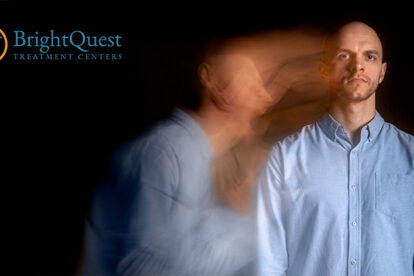Are You in a Codependent Relationship With Your Mentally Ill Loved One? Recognizing the Signs and Learning Healthy Coping Mechanisms

Codependent relationships are not healthy. They harm both people in the relationship. It’s not uncommon for someone to develop codependency with a partner or family member with mental illness. This is damaging for the person with mental illness because it hinders their progress. For the other partner, unhealthy patterns and behaviors lead to insecurity, anxiety, and dissatisfaction. Fortunately, codependency is not permanent. If you can recognize the signs and get therapy and treatment, you can build a better, healthier relationship while also helping your loved one manage mental illness.
Codependency can be very difficult to see when you’re in the middle of it. A codependent relationship is one-sided and unhealthy. One person relies on the other to meet most or all of their emotional needs. It’s a situation that enables bad behaviors and poor choices. It can also interfere with mental illness treatment, making symptoms and episodes worse.
If your partner or another loved one has a mental illness, consider the signs of codependency. It’s important to recognize them, and if you see them in your relationship, to do something about it. Your loved one’s mental illness won’t improve, and you won’t feel truly happy and fulfilled, until you work on boundaries and a healthier relationship.
Codependency and Mental Illness
People most vulnerable to codependency didn’t have a good framework in childhood for developing healthy relationships. Dysfunctional families fail to demonstrate what a healthy, loving relationship looks like.
The dysfunction that may lead to later codependency can be anything from trauma to substance abuse or mental illness. While the term codependency originally applied to relationships in which one person enabled the other’s addiction, it also applies to mental illness.
If you love or care about someone with a mental illness, you may establish a codependent relationship. This means you compensate for your loved one, do everything for them, and don’t let them fail or experience the consequences of their poor choices. You develop a strong, unhealthy attachment to that person.
While you’re not enabling an addiction, you are hindering their ability to manage their mental illness. This can lead to worsening symptoms and dysfunction in their lives. It’s also unhealthy for you to be in this type of relationship. You likely feel insecure, guilty, overwhelmed, stressed, and afraid of being abandoned by your loved one.
What Are the Signs of a Codependent Relationship?
Anyone in a close relationship with someone with mental illness should know the signs of codependency. There is always a risk this kind of relationship will develop when addiction, mental illness, or both are involved. Here are some important signs you might be codependent with your loved one:
- You put aside your own needs and devote most of your time and energy to meeting your loved one’s needs. You consider your needs to be less important and have a hard time identifying and asking for what you need. Your excessive caretaking of a loved one enables their bad behaviors and their mental health symptoms, holding them back from making progress.
- You are a people pleaser and see yourself as totally unselfish. You feel like you only have worth when helping or serving others, especially your partner or loved one. You have a hard time saying no.
- You have low self-esteem and often feel guilty and ashamed, especially if you can’t make things perfect. You judge yourself harshly and don’t see yourself as having much worth or of being worthy of love.
- You have a problem with boundaries, either giving too much of yourself or holding people at a distance with rigid boundaries. Most codependents have weaker boundaries. This can make you overreact to what people say and do. You take it too much to heart and assign more worth to other people’s actions and thoughts than you should.
- You feel a strong need to control your loved one. This makes you feel safer and more secure in the relationship and about yourself. Control can look like care and love. Intense and devoted caretaking and people-pleasing behaviors are often a type of control.
- You obsess over certain aspects of your relationship with your loved one. Your fears and insecurities cause you to obsess over conversations, what they said, or what they did and how that may reflect on you.
- You have a strong fear of being abandoned or left by your loved one. You feel like you can’t live without them. This fear of abandonment leads to many of the dysfunctional behaviors of codependency, like obsession and caretaking.
Begin Your Recovery Journey Today.
619-466-0547How to Build a Healthier Relationship
Codependency is not an official mental health diagnosis, but it is a very real phenomenon. Mental health professionals recognize it and can treat it. Building a healthier relationship between you and your loved one with mental illness means getting treatment for each of you individually.
Your loved one needs regular treatment for their mental illness. You need therapy to learn how to feel more secure in general and specifically in your relationship. When you feel more secure, you will drop the behaviors of codependency and feel happier and more fulfilled.
Start with treatment, especially for the mental illness, and then work together to build a relationship that is healthier and better for both of you. These are some strategies that will help you both do that:
- Identify your codependent patterns. Therapy will help you understand what codependency looks like. With that new information, take a critical look at your relationship and your thoughts, reactions, and behaviors. Identify the recurring patterns that line up with codependency. Only when you know what they are can you begin to change them.
- Identify and get to know healthy relationships. Just as important as being able to point out what you don’t want in a relationship is identifying healthy patterns and behaviors. It can be tough to recognize these, especially if you did not see them modeled as a child. Look at relationships between people in your life that are healthy and happy. Analyze those relationships and pinpoint the aspects of them that are different from and healthier than codependency.
- Get to know yourself. As a codependent, you have lost yourself in this relationship. You need to spend some time on you, getting to know yourself, who you are, and what you need to make you happy. You have spent so much time focusing on someone else’s needs that you don’t even know what your own are. Spend time alone if need be. Do activities you enjoy. Learn to be selfish at times.
- Set boundaries. Establishing boundaries in your relationship will be a challenging but important step. Practice saying no to requests for your time and attention. Listen to your loved one with compassion and empathy, but stop short of trying to solve their problems for them.
- Relinquish control. This is another tough change for a codependent. Remind yourself constantly that the only person you can control is you. You have no real control over your loved one or anyone else. Provide support but don’t expect to be able to change or control them.
- Provide healthy support. Your loved one with mental illness needs support, maybe more than other people in your life. It’s time to shift from controlling and enabling to providing healthy support. This means encouraging them to stay in treatment, listening to them, talking them through solutions to their problems, and accepting them for who they are. Avoid trying to solve their problems, making decisions for them, or offering advice when not requested.
These are very difficult changes to make if you have been codependent for a long period of time. The best thing you can do for each other and the relationship is treatment. Individual treatment along with relationship therapy will help you both make the changes that will lead to a healthier, happier relationship together.






